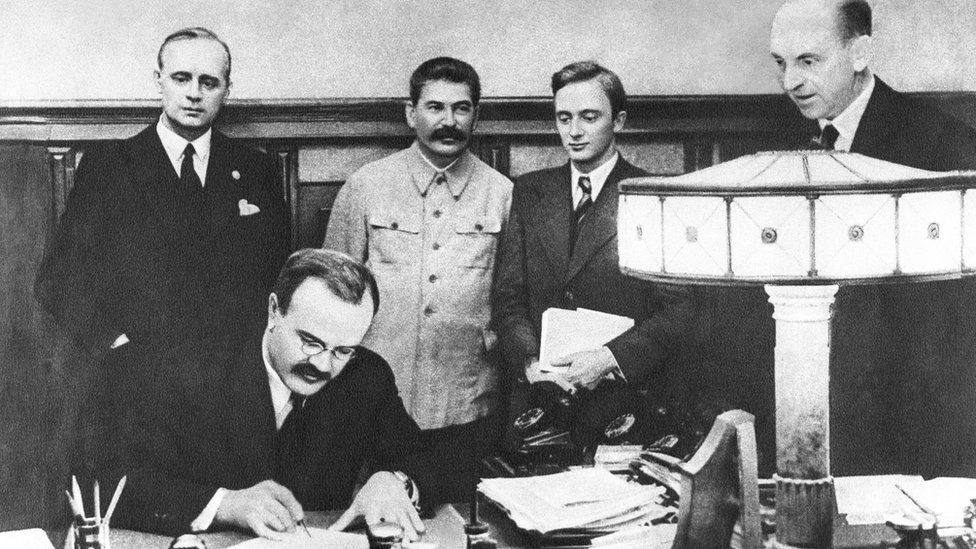Molotov-Ribbentrop: Five states remember 'misery' pact victims
- Published

The Baltic states, Poland and Romania have called on Europe's governments to stand against totalitarian regimes, 80 years after the signing of the 1939 Molotov-Ribbentrop pact.
The Nazi-Soviet non-aggression agreement included a secret protocol that redrew the map of Europe.
Fifty years later, up to two million people joined hands across the Baltics in a peaceful, anti-Soviet protest.
The Baltic Way human chain galvanised the Baltic push for independence.
For fifteen minutes on 23 August 1989, people held hands along a stretch of more than 650km (400 miles) from Tallinn in Estonia, via Riga in Latvia to the Lithuanian capital, Vilnius.
Inspired by their achievement, pro-democracy protesters in Hong Kong on Friday were to stage a 40km human chain. There have been weeks of protest against a proposed law that would allow extraditions to China. The bill has since been suspended.
What was the Molotov-Ribbentrop pact?
The Baltic Way protesters chose the anniversary of the pact between the Soviet Union and Nazi Germany to highlight the secret deal to carve up Europe.
Officially it was a non-aggression, neutrality pact. But under a secret protocol agreed in Moscow by the countries' two foreign ministers, Latvia, Estonia and Finland were to be consigned to the Soviet sphere while Lithuania came a few days later. Poland was to be carved up and part of Romania handed to the Soviets.
Within days, Poland was invaded by Nazi Germany, and by the Soviets not long after. The non-aggression pact ended with the Nazi invasion of Russia in June 1941.
What do the five EU states say?
In a statement on Friday to mark the 80th anniversary of the pact, the foreign ministers of Poland, Romania and the three Baltic republics said the Molotov-Ribbentrop pact had "doomed half of Europe to decades of misery".
They said the memory of the victims "compels us to promote historical justice by... raising public awareness of the totalitarian legacy on the European continent", and they warned of disinformation campaigns aimed at manipulating history.
Remembering the fall of Iron Curtain, they added that 30 years ago their nations began the democratic transformations that led to them becoming "vigorous members of the European Union".
What does Russia say?
An exhibition opened this week featuring documents from 1939 that include the infamous Soviet-Nazi pact.
The message from figures in Moscow was that Russia had offered an alliance to France and Britain to counter Adolf Hitler, but that the talks were going nowhere.
The "irresponsible and cowardly policies" of Britain and France had pushed Hitler's Germany to attack the Soviet Union, said foreign intelligence head Sergei Naryshkin.
What do Russians think of Stalin?
"Not wanting to wage war on two fronts, Germany made unprecedented concessions to guarantee Soviet neutrality in the Polish campaign," he added.
Foreign Minister Sergei Lavrov, speaking at the opening of the exhibition, accused a number of countries of making short-sighted decisions aimed at appeasing Hitler.
"Naively calculating that the war would pass them by, the Western powers played a double game. They tried to steer Hitler's aggression eastwards. In those conditions, the USSR had to safeguard its own national security by itself," he said.
- Published13 July 2019
- Published21 June 2011